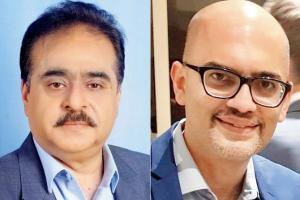As Mumbai is poised to pull an all-nighter from January 27, a debate on the subject simmers, reports Hemal Ashar

Dilip Datwani and Subhash Motwani
Good for economy, says Dilip Datwani
ADVERTISEMENT
If I were cooking eggs at this point in time, I would say that the hospitality industry's sunny side up moment is here. We have waited a long time for this to happen. Though this is the first phase, a pilot, where establishments will be allowed to be open within certain areas, like in malls and commercial spaces, the nightlife will give people breathing space.
Those who finish work late at night and had always wanted to go to a restaurant to unwind will now be able to do so. This is a city where dining out falls in the entertainment category. I think it will also ease traffic woes to an extent, because everybody will not be rushing out at the same time. It will also be help in employment generation and cement Mumbai's reputation as an international city.
International tourists hear about this city that never sleeps. But when they come here, they see the restaurants and other establishments shut at night. Now, they may delay their connecting flights to spend a night in Mumbai, and this is very likely to help the government earn R15,000 crore in forex in a year.
For restaurateurs who depend on the weekends to make big money, this will give them a bigger window to do so and ease pressure. The expenses should hopefully be offset by the profit.
I think this will also enhance safety, as more people on our streets mean more safety. The earlier deadline of 1.30 am stays for alcohol and I understand where the government is coming from. It would have been good if it was extended by one hour at least, but we have to take things one step at a time. We are optimistic about this trial. Let's make this great initiative work.
Dilip Datwani is former president of Hotel and Restaurant Association of Western India.
Bad for environment, believes Subhash Motwani
Mumbai gets a nightlife may sound exciting but there are huge concerns, too. Roads across the city are dug up, and now we will have cars on these roads late at night even when commuting is a challenge irrespective of the time of the day.
Will we have the police personnel patrol and enforce law and order when establishments are open 24X7 and there are more people on the roads at night? Several times when there are problems in the day, residents call the local police but they take time to respond because of skeletal strength. We have to ask if the police machinery is equipped for this all-nighter. I think it would have been better if this had been mooted two years from now, when we have infra and facilities to support this.
Though shops and restaurants will remain open in certain areas during the initial stage, the spill over of this will affect residential pockets. For instance, who can stop groups of people returning home at an unearthly hour from talking loudly and disturbing the peace of others? We may hear bikes and cars screeching madly in the few hours of relative silence that this city has.
Let us also see the demographic supremely excited by this. It is the age group of 18 to 26 years, who effectively feel that they have a licence to party all night. This is going to be a huge challenge for parents, too. Those who work night shifts, or graveyard shift as it is popularly called, like in BPOs, do report a rise in health problems. While here, people would not be working, they will be staying awake till very late hours.
We have touched upon times and crimes but do not forget climes too. Pollution reduces for a few hours when the city slows down at night. Now, we will see a rise in pollution with cars on the street all the time.
Why should Mumbai want to be a Las Vegas? Why can't we be a green Berlin?
Subhash Motwani is president of Clean Heritage Colaba Residents' Association.
Catch up on all the latest Crime, National, International and Hatke news here. Also download the new mid-day Android and iOS apps to get latest updates
 Subscribe today by clicking the link and stay updated with the latest news!" Click here!
Subscribe today by clicking the link and stay updated with the latest news!" Click here!






